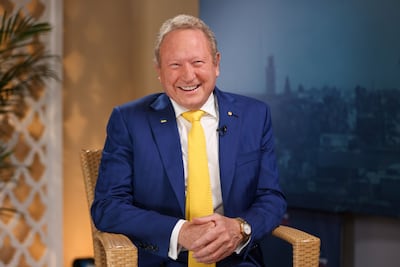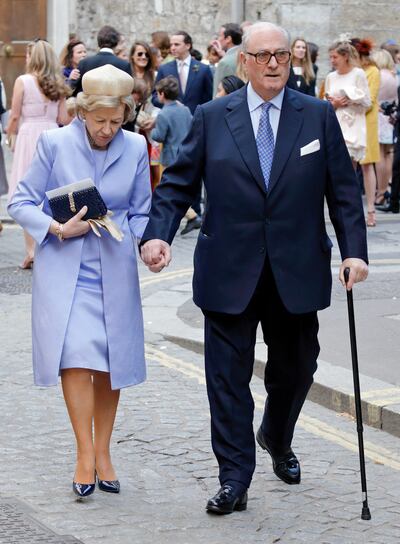Gautam Adani
Billionaire Indian tycoon Gautam Adani's ports-to-power conglomerate is in talks with lenders, including global banks, as it seeks to refinance a loan of up to $3.8 billion taken for its acquisition of Ambuja Cements last year, according to sources.
The Adani Group is considering whether to convert the original loan into debt with a longer maturity period and has started talking to banks individually about that plan, said the sources.
The effort is a significant test of whether global credit lines will open up to the company again after US short-seller Hindenburg Research accused the Adani Group of widespread corporate malfeasance in January.
The group, which has denied the allegations, aims to conclude the process within three to four months, with most of the existing lenders expected to participate, the sources said. A company representative did not immediately respond to a request for comment.
Watch: How India's Gautam Adani lost title as Asia's richest man
Banks such as Barclays, Deutsche Bank, Standard Chartered and Mitsubishi UFJ Financial Group are in talks to participate in the refinancing deal, with some of the lenders having gone to their respective international credit teams to obtain approval for the arrangement, the sources said.
Barclays, Deutsche, MUFG and Standard Chartered declined to comment. The deal has yet to be finalised and may not proceed.
If it moves ahead, it would be the latest sign of the conglomerate returning to business as usual after months of damage control following Hindenburg’s scathing broadside that at one point shaved more than $150 billion from the company’s valuation.
A panel of experts appointed by India’s Supreme Court also said in a report last month that there was no regulatory failure or wrongdoing behind the wild swings of Adani stocks.
Still, another verdict is expected from India’s securities watchdog in August after it finishes its probe into the short-seller’s allegations against the group.
Adani’s purchase of Holcim’s Indian cement assets last year made the conglomerate the country’s second-largest producer of the construction material.
To finance that deal, bridge loans maturing in 2023 and 2024 were taken out by Mauritius-domiciled Endeavour Trade & Investment, the Adani Group vehicle that acquired Holcim’s cement business.

Andrew Forrest
Andrew Forrest, the Australian billionaire investing much of the fortune he made in iron-ore mining on green power, has criticised doubters of hydrogen fuel-cell technology, including Elon Musk.
“Anyone, including Elon, including, you know, whoever you like, who says hydrogen hasn’t got a massive future are muppets,” Mr Forrest, 61, said at the Bloomberg New Economy Gateway Africa forum in Marrakech, Morocco, last Tuesday.
“Battery and fuel cells are the way of the world in the future.”
Mr Musk, the world’s richest person and chief executive of electric car maker Tesla, has previously described hydrogen fuel-cell technology as “the most dumb thing I could possibly imagine for energy storage”.
While Mr Musk uses lithium-battery technology in Tesla vehicles, Mr Forrest is focusing on using green energy, including solar, to produce hydrogen, which is then stored and used to power fuel cells in the car industry and other sectors.
Mr Forrest is the founder, chairman and biggest shareholder in Perth-based Fortescue Metals Group.
Tesla did not immediately respond to a request for comment.

Ryan Cohen
GameStop’s revolving leadership door and an unclear strategy in how it can compete in the video-game retail industry has puzzled Wall Street analysts. However, for its legions of retail traders, what matters most is billionaire investor Ryan Cohen.
Its newly appointed executive chairman, who founded Chewy before PetSmart bought it, helped to trigger a more than 2,000 per cent surge in GameStop in early 2021 and now has formal oversight of capital allocation and management.
His task is formidable, as the stock’s stratospheric rise – up 382 per cent since the end of 2020 – contrasts with lacklustre sales and a hefty valuation that is keeping traditional investors away.
“GameStop has taken on an almost mythological quality – it’s no longer about earnings or profit or revenue; it’s a story about a wild party where everyone made and lost a lot of money,” said Peter Atwater, an adjunct economics professor at William & Mary university in Williamsburg, Virginia.
“It’s less about what exists today than the potential that folks ascribe to Ryan Cohen and what he might be able to do with it.”
GameStop has gone through four permanent chief executives in less than six years, with Matt Furlong, the most recent to helm the company, fired on June 5.
It is also on its third finance chief since 2021. The string of changes has cast an already sceptical analyst base to question what is next after quarterly results disappointed again and the company’s business model remains challenged.
GameStop has been profitable in only two quarters since Mr Cohen’s first disclosed his initial stake in August 2020. Its latest annual revenue of $5.9 billion is largely unchanged since then and remains well below its 2016 peak of $9.4 billion.
Last Wednesday, the company reported first-quarter sales that fell 10 per cent from a year earlier. While earnings per share met expectations, that was driven by cost cuts. Investors seeking clarity on its strategy have been disappointed given that the retailer has not taken analyst questions on an earnings call since late 2020.
Mr Cohen cofounded pet retailer Chewy before selling it for $3.4 billion in 2017 after successfully taking on the likes of Amazon and bucking concerns the company would fail in the same way as Pets.com.
The billionaire became an idol to amateur investors after he gained a seat on GameStop’s board in January 2021. He plans to borrow from the model he used at Chewy to turn GameStop around.
His popularity grew as he hit back at critics through tweets and his followers then snapped up shares of any company he touched.
Bed Bath & Beyond grabbed the meme stock baton – after Mr Cohen took a stake – before ultimately filing for bankruptcy in April and wiping out millions for retail traders.
Mr Cohen dumped his shares and options in August 2022, pocketing $68.1 million in profit.
The departure of former Amazon executives poached by GameStop, such as Mr Furlong, may be a critical point in the evolution of the company.
Mr Cohen is now the face of the company that also counts him as its largest investor. He also has the full support of the retail crowd that often refers to him as “Papa Cohen”.

Charles Cadogan
Charles Cadogan, the billionaire aristocrat behind one of London’s biggest property fortunes, died last Sunday at the age of 86.
He died at home in Chelsea, according to his family's investment company.
“He found enjoyment and amusement readily and was wonderful company, gregarious and voluble,” the Cadogan Group said.
“He described himself as a ‘countryman’ and while his family business has been very successful under his stewardship, he felt most comfortable in the role of philanthropist.”
Cadogan, the eighth Earl of Cadogan, was the UK’s 14th-richest person before his death, with a net worth of about $6 billion, according to the Bloomberg Billionaires Index.
His family has owned land in the central London areas of Kensington and Chelsea – home to some of the city’s most famous retail districts – since the 18th century and controls the assets through a series of trusts.
The Cadogan Group’s property portfolio was worth £5.1 billion ($6.4 billion) at the end of 2022, rising 5.4 per cent from 12 months earlier as values rebounded from the Covid-19 pandemic.
While the closely held company is still focused on London, it said last year that it planned to increase deals outside the city to provide an alternative source of income to fund the tax costs the family’s trusts face once every decade.
The London-based group has paid more than £300 million over the past 10 years to help cover the tax bill, according to data compiled by Bloomberg.
Mr Cadogan was born in March 1937 and educated at Eton College. He completed two years of national service with the British Army before joining the company that became Schroders.
He left in 1974 to help oversee his family’s estate, which dates back to 1717 when a Cadogan ancestor married Elizabeth Sloane, the daughter of Hans Sloane, a physician to the royal family who owned 166 acres (67.1 hectares) of land in Chelsea.
He oversaw several major developments during more than three decades at the Cadogan Group, including the purchase of the Duke of York’s Headquarters army barracks in 2000.
The Chelsea site was redeveloped to include housing, retail outlets and the Saatchi Gallery. Concert venue Cadogan Hall was refurbished and reopened in 2004 and is now the permanent home of the Royal Philharmonic Orchestra.
He retired as chairman of the Cadogan Group in 2012.

